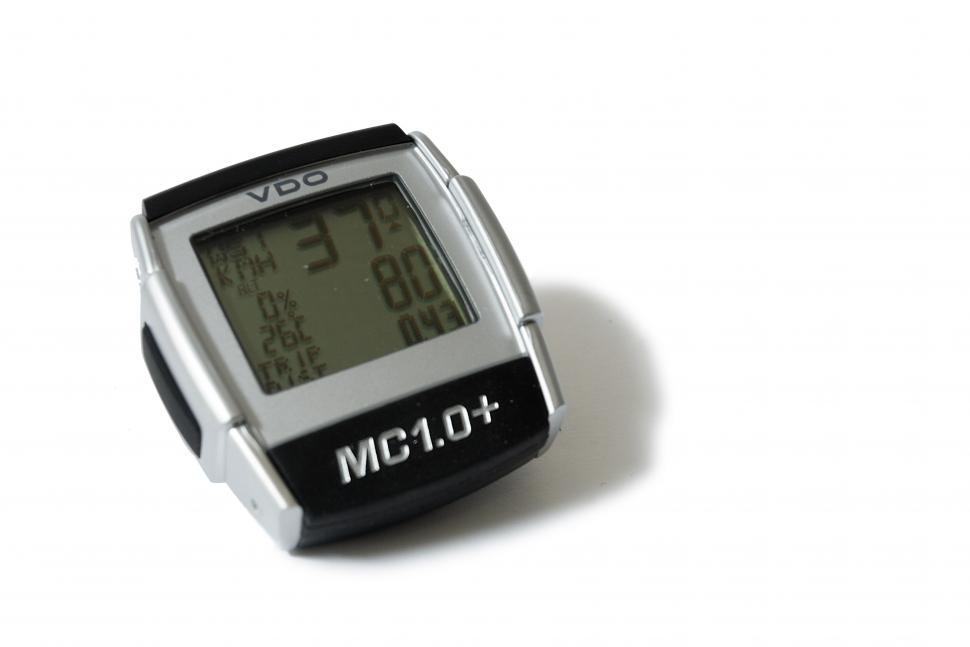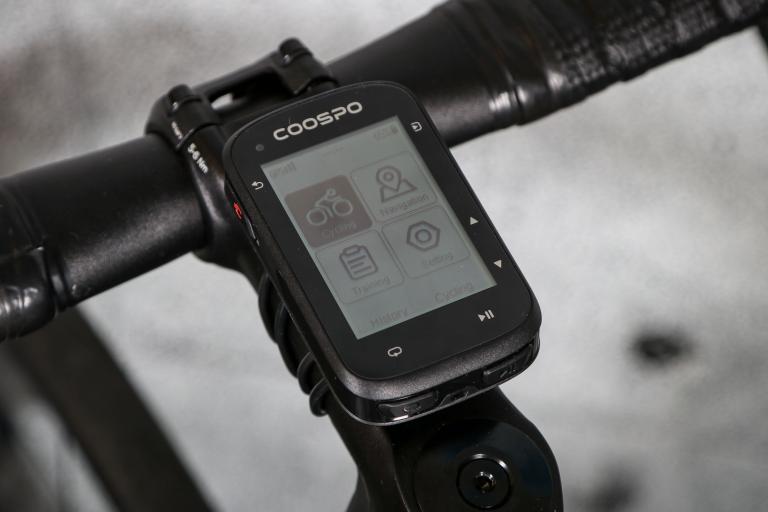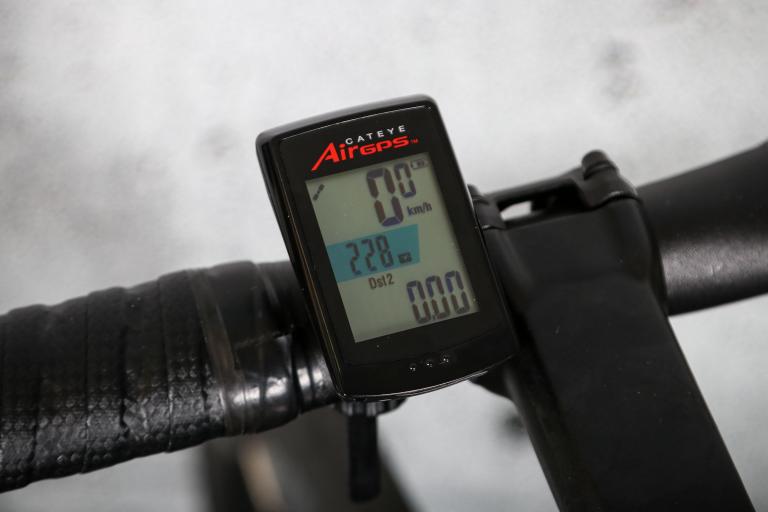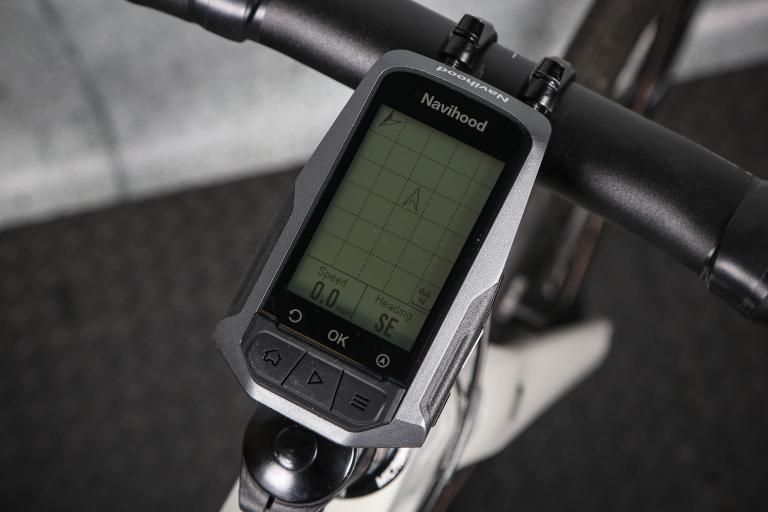- News
- Reviews
- Bikes
- Accessories
- Accessories - misc
- Computer mounts
- Bags
- Bar ends
- Bike bags & cases
- Bottle cages
- Bottles
- Cameras
- Car racks
- Child seats
- Computers
- Glasses
- GPS units
- Helmets
- Lights - front
- Lights - rear
- Lights - sets
- Locks
- Mirrors
- Mudguards
- Racks
- Pumps & CO2 inflators
- Puncture kits
- Reflectives
- Smart watches
- Stands and racks
- Trailers
- Clothing
- Components
- Bar tape & grips
- Bottom brackets
- Brake & gear cables
- Brake & STI levers
- Brake pads & spares
- Brakes
- Cassettes & freewheels
- Chains
- Chainsets & chainrings
- Derailleurs - front
- Derailleurs - rear
- Forks
- Gear levers & shifters
- Groupsets
- Handlebars & extensions
- Headsets
- Hubs
- Inner tubes
- Pedals
- Quick releases & skewers
- Saddles
- Seatposts
- Stems
- Wheels
- Tyres
- Health, fitness and nutrition
- Tools and workshop
- Miscellaneous
- Tubeless valves
- Buyers Guides
- Features
- Forum
- Recommends
- Podcast
review
 VDO MC1+ computer
VDO MC1+ computer£78.29
VERDICT:
Not the easiest to use, but lots of good information at your fingertips.
Weight:
0g
Contact:
www.fisheroutdoor.co.uk
At road.cc every product is thoroughly tested for as long as it takes to get a proper insight into how well it works. Our reviewers are experienced cyclists that we trust to be objective. While we strive to ensure that opinions expressed are backed up by facts, reviews are by their nature an informed opinion, not a definitive verdict. We don't intentionally try to break anything (except locks) but we do try to look for weak points in any design. The overall score is not just an average of the other scores: it reflects both a product's function and value – with value determined by how a product compares with items of similar spec, quality, and price.
What the road.cc scores meanGood scores are more common than bad, because fortunately good products are more common than bad.
- Exceptional
- Excellent
- Very Good
- Good
- Quite good
- Average
- Not so good
- Poor
- Bad
- Appalling
The VDO MC1.0+ is a feature heavy computer that'll give you a wealth of information about your ride. It takes a little while to get to know all the functions, but once you do it's a great ride companion.
Getting the computer on your bike is a simple enough process: the sensor and computer mount attach with two zip ties each (though oddly ours only came with three zip ties) and the magnet tightens with a thumb screw, so no tools are needed at all. The range of the sensor is okay, it didn't work reliably on the rear wheel so it's not a good choice for turbo heads. The twist-in mount is one of our favourites, the design meaning that there's no way the computer can shake loose.
Put the batteries in, set the language and it's time to, erm, read the manual. Not that you can't use the MC1.0+ straight away, but the setting up process and changing of counters is not an intuitive operation. There are three buttons (which are relatively glove-friendly), each of which accesses a range of functions: left for basic trip stuff, middle for altimeter and right for other bits and bobs. you always get your speed in big numbers, your altitude, current gradient and current temperature; everything else can be displayed in the bottom right hand corner.
Re-setting counters, setting the clock, changing the wheel sizes and so on requires a combination of selecting the right readout and clicking the right buttons in the right order. Once you've got the hang of it all of this kind of makes sense, but it takes a bit of learning.
So what of the functions? Well, you get the normal trip bits, including an actual/average comparison arrow which is always welcome, and the MC1.0+ can store two wheel sizes, so it's a breeze to swap between bikes if you buy another mounting kit. There's a programmable trip counter which is great if you're following a route: if you miss a turn, or your computer doesn't tally with the guide, you can just set the numbers to match the book, rather than having to do mental arithmetic at each junction.
The altimeter works on barometric pressure and proved to be fairly accurate out on the road, giving climbing figures that were pretty close to GPS readouts on the same climb. Obviously changing pressure affects the readout but I found that it didn't tend to change the start/finish altitude by more than about 10-20m on a ride, and the gradient information and changing altitude out on the road are useful: if you're struggling on what you think is a flat section it's easy to find out if it really is flat. You can manually adjust the altitude at any time (say at the top of a col when you know how high up you are) and set a home altitude. The MC1.0+ counts every metre you climb, giving you a tally for each ride and a cumulative total. The thermometer isn't bad, though it's less useful as you'll have already checked what the weather's going to be like before you set out...
Overall the VDO scores well for functionality, a bit less well for usability, though once you get the hang of it things start to get easier. You get lots of numbers to bandy about at the end of a ride, many of which are useful. If you like ride stats the MC1.0+ is a good, and not overly expensive, way to garner them.
Trip functions:
1 actual speed
2 trip counter
3 odometer WS1
4 odometer WS2
5 odometer total
6 ride timer
7 clock
8 average speed
9 maximum speed
10 stopwatch
11 comparison of actual speed and average speed
12 Second programmable trip counter
13 2 wheel sizes
Altimeter functions
1 altitude
2 gradient
3 temperature
4 altitude gain on trip
5 maximum altitude reached on trip
6 average gradient on trip
7 maximum gradient on trip
8 total altitude gain on all trips, separate for wheel size
9 maximum altitude reached on all trips, separate for wheel size
Dave is a founding father of road.cc, having previously worked on Cycling Plus and What Mountain Bike magazines back in the day. He also writes about e-bikes for our sister publication ebiketips. He's won three mountain bike bog snorkelling World Championships, and races at the back of the third cats.
Latest Comments
- Hirsute 4 sec ago
It was other pedestrians and sacks of potatoes falling from the sky.
- slc 9 min 29 sec ago
The council debate is at https://www.youtube.com/watch?v=jTbSPFs4-XI&t=2s. Starting at 42.00 ish.
- Daveyraveygravey 10 min 39 sec ago
So many choices! Have a look at Fairlight, and also Mason. A lot of Mason bikes are over £3k but they make steel and ally ones that you should be...
- wtjs 43 min 55 sec ago
I'm always pleased to see a fellow victim of the Never Let It Go tendency give rein to his obsession!
- Rendel Harris 42 min 25 sec ago
Currently available on Amazon UK here for £79.99....
- David9694 1 hour 2 min ago
That's how I recall it - they could have staved-off parking charges for another year. There's still a chance they'll pull the revisions which I...
- Kendalred 1 hour 9 min ago
"David Amos, 66, owner of Mr D's takeaway in Bath claimed the new scheme was "unnecessary" and "ill-conceived". He also alleged that the cycle lane...
- wtjs 1 hour 29 min ago
Good to see KOM hubs on the adjacent stand at the show- I would like to have a good reason to have one built into a wheel because the design is so...
- OnYerBike 2 hours 18 min ago
You're misunderstanding why it's called "rebreathing". The "rebreathing" aspect is because the CO/air mix is re-circulated for a period in a closed...
- Roentgen 2 hours 31 min ago
Pogi makes a good point....




Add new comment
2 comments
As you're friends with your local Zyro rep. Could you blag some of their cheap Cateye wired computers to test?
Looking for one to fit to my commuter bike, so should be clear, accurate and water proof. And I almost for got: simple to use - just basic information no need for 200 ways to tell me I'm too SLOW. I know already!
Just a quick update to the above to say that the MC1.0+ is very susceptible to interference from certain LED lights. I've just started testing a Cateye EL-120 unit and the VDO doesn't like that at all. The previous light I was testing didn't have any effect on it though. Check with your light, if you can, if you're planning to buy one. I haven't had any spurious readings from other sources so far...